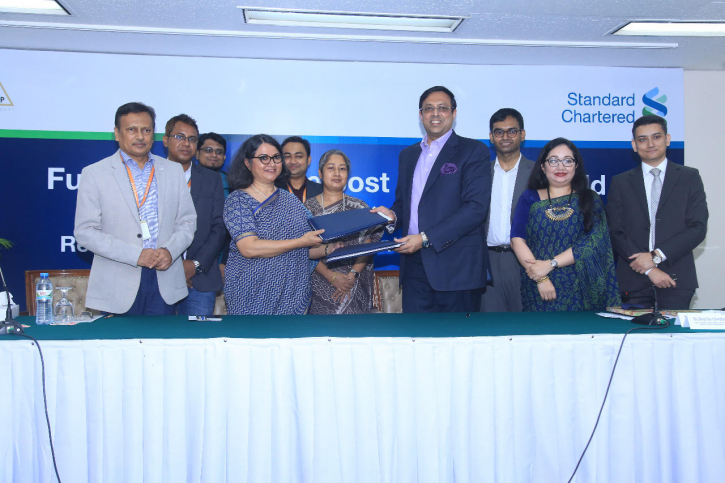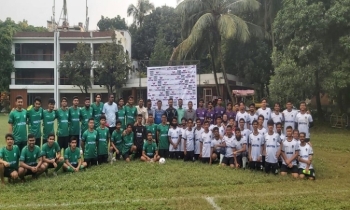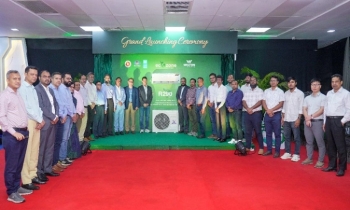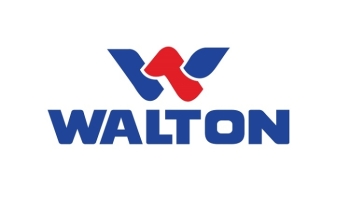StanChart, UCEP partners up for re-skilling programme
BI Report || BusinessInsider

Photo: Standard Chartered
Standard Chartered and UCEP Bangladesh have jointly announced the launch of a re-skilling and employment reintegration programme for economically vulnerable individuals who have lost their livelihoods due to the impact of Covid-19.
The global health crisis is having a disproportionate impact on the economically-vulnerable, who are facing major challenges to their livelihoods caused by the economic fallout of the ongoing global health emergency, a press release from Standard Chartered reads.
Even once it regains its growth momentum in the post-Covid-19 world, Bangladesh’s economy will likely have undergone fundamental and structural changes during the recovery.
Successful upskilling and reskilling of our workforce for the ‘new normal’ would be a vital step in achieving the long-term growth aspirations of our nation, the press release further says.
Under this initiative, UCEP Bangladesh will conduct a rapid needs assessment study to identify the skills gaps in both formal and informal sectors, and the opportunities created by the disruptions caused by Covid-19.
Based on the findings of this study, demand-driven training programmes will be developed that prepare participants with the skills to best meet current and future demands of the job market.
The graduates will then go through a job placement programme to complete their reintegration within the economy.
“Covid-19 is a once-in-a-century challenge that has forced us to rethink our way of life. It is also a generational opportunity, a chance to mould the new normal on our own terms, building a more resilient and equitable society,” Standard Chartered Bangladesh CEO Naser Ezaz Bijoy said while speaking on the occasion.
“Partnership with UCEP is our attempt to help the pandemic-impacted workforce to become future-fit and to get reintegrated as the gainfully employed workforce to contribute to our beloved nation’s next journey towards prosperity,” he added.
Executive Director of UCEP Bangladesh Tahsinah Ahmed said, “The Covid-19 pandemic has opened up opportunities in the domestic market especially in the health, agriculture and technology sectors. Standard Chartered has been supporting UCEP Bangladesh in skilling and upskilling of youth, especially females in demand-oriented occupations.”
Standard Chartered is currently focusing its community support measures in five key areas:
- Providing life-sustaining food and hygiene support to 120,000 individuals, providing 3,600,000 meals and personal hygiene material through Bidyanondo Foundation, BRAC and Kumudini Welfare Trust.
- Supporting life-saving medical services for 560 critically-affected COVID-19 patients through Sajida Foundation and Bidyanondo Foundation.
- Supporting livelihood of 2000 farmers by directly sourcing 200 tonnes of fresh produce and delivering them free of cost to 200,000 direct beneficiaries with OBHIZATRIK Foundation.
- Supporting education by contributing BDT 109,135,000 (USD 1.3 million) to UNICEF to be used for protection measures and remote education of vulnerable children.
- Supporting the healthcare workers fighting on the frontlines by contributing Tk25,185,000 ($300,000) to Red Cross programmes.
The bank had announced a broad range of support measures for its retail customers and businesses, including loan repayment holidays, fee waivers or cancellations and loan extension facilities, in addition to the government-led support measures.
It has initiated a $1 billion global financing programme for companies that provide goods and services to help the fight against Covid-19. It has also launched a$50 million fund aiding communities affected by the pandemic across its global footprint, including Bangladesh.
























